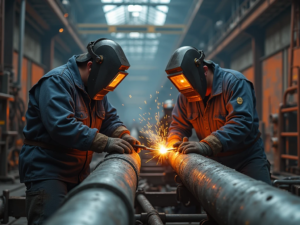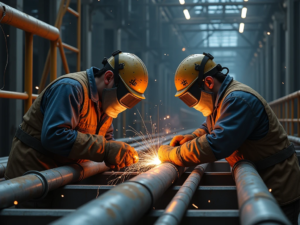Pipe welding is a specialized field of welding that involves the fusion of metal pipes to create secure, leak-proof connections. These welders are integral to a wide range of industries, from oil and gas to construction and utilities, and their expertise ensures the safe and efficient transport of liquids, gases, and other materials. This article will explore the critical role of pipe welders, the skills and techniques they use, and the various industries that depend on their work.
The Importance of Pipe Welders

Pipe welders are skilled professionals who perform essential tasks in the construction, maintenance, and repair of pipe systems. These systems transport a variety of substances—water, oil, gas, chemicals, and even steam—across vast distances. A single leak or faulty connection can lead to significant problems, ranging from environmental hazards to production delays and financial losses. As a result, the quality of the welds made by pipe welders is of paramount importance.
Their work directly impacts public safety, industrial efficiency, and environmental protection. For instance, in the oil and gas industry, a defective weld can lead to catastrophic leaks, explosions, or contamination of natural resources. In construction and utilities, the reliability of water, sewage, and heating systems depends on pipe welders ensuring that joints and connections are properly sealed.
Pipe welders not only play a critical role in the safety and reliability of these systems but also contribute to their longevity. Properly welded pipes last longer and require fewer repairs, which is essential for maintaining the continuous flow of resources and minimizing downtime.
The Role and Responsibilities of a Pipe Welder
The primary responsibility of a pipe welder is to join sections of pipe together using welding techniques that ensure strength, durability, and leak resistance. This work can take place in a variety of environments, including construction sites, manufacturing plants, and oil rigs, and requires a combination of technical knowledge, precision, and physical skill.
Some of the key duties and responsibilities of a pipe welder include:
- Preparing Pipe Surfaces: Before welding, pipe welders must prepare the surfaces of the pipes to ensure proper adhesion. This may involve cleaning the metal, removing rust or contaminants, and sometimes beveling the pipe ends to create the correct fit for welding.
- Welding Pipe Joints: The welder uses various techniques to join pipes, including stick welding (SMAW), TIG welding (GTAW), MIG welding (GMAW), and flux-cored arc welding (FCAW). The choice of method depends on the material of the pipe, the thickness of the wall, and the specific requirements of the project.
- Ensuring Quality and Strength: Pipe welders are tasked with producing welds that meet strict quality standards. They must ensure the welds are strong enough to withstand the pressure and stress that pipes will encounter. This is particularly important in high-pressure systems such as gas pipelines or in hazardous environments like chemical plants.
- Inspection and Testing: After completing a weld, pipe welders may perform tests to ensure the integrity of their work. Non-destructive testing (NDT) methods, such as ultrasonic testing or x-ray inspection, are commonly used to detect internal flaws or weaknesses in the welds without damaging the pipes.
- Maintaining Safety Standards: Welding is a hazardous activity that involves intense heat, electrical equipment, and sometimes exposure to harmful fumes or gases. Pipe welders must adhere to strict safety guidelines, including wearing protective gear such as welding helmets, gloves, aprons, and boots, as well as following proper ventilation procedures to prevent inhalation of harmful fumes.
Skills and Techniques Used by Pipe Welders
Pipe welding is a highly specialized skill that requires a deep understanding of metallurgy, welding techniques, and safety protocols. Below are some of the key skills and techniques employed by pipe welders:
- Knowledge of Welding Methods: As mentioned earlier, pipe welders may use a variety of welding methods, each suited to specific materials and conditions. Some of the most common welding methods used in pipe welding include:
- Stick Welding (SMAW): This is one of the most common techniques for pipe welding. Stick welding uses a consumable electrode to create the weld. It is particularly useful for welding pipes in outdoor or harsh environments because it is versatile and can be used on a wide range of materials.
- TIG Welding (GTAW): TIG welding is a more precise and cleaner method of welding, which involves using a non-consumable tungsten electrode. This method is often used for thin-walled pipes or for welding materials like stainless steel and aluminum.
- MIG Welding (GMAW): MIG welding uses a continuous wire feed and is faster than TIG welding. It is commonly used for welding pipes in industrial settings, especially for carbon steel pipes.
- Flux-Cored Arc Welding (FCAW): This method is similar to MIG welding but uses a flux-cored wire to provide additional shielding. It is often used for welding thicker pipes or for pipes that will be used in high-pressure systems.
- Understanding of Materials: Pipe welders must have a strong understanding of different materials used in piping systems, such as steel, stainless steel, aluminum, copper, and various alloys. The properties of these materials, such as their melting points, corrosion resistance, and tensile strength, affect the welding process and the quality of the final weld.
- Blueprint Reading: Pipe welders must be able to read and interpret blueprints, technical drawings, and welding symbols. This skill is crucial for understanding the specifications of the job, such as pipe dimensions, joint configurations, and material requirements, as well as ensuring that the finished product meets the project’s design standards.
- Precision and Attention to Detail: A pipe welder must be able to make accurate measurements and perform delicate tasks with a high degree of precision. A small mistake in the welding process can lead to weak joints, leaks, or failed inspections. Attention to detail is also crucial for ensuring the proper alignment of pipes and the correct placement of welds.
- Problem-Solving Abilities: During the welding process, pipe welders may encounter unexpected challenges, such as misaligned pipes, irregular joint angles, or difficult-to-reach welding positions. A skilled welder must be able to think critically and creatively to overcome these obstacles while maintaining quality and safety.
Industries That Rely on Pipe Welders

Pipe welders are in high demand across a wide variety of industries. Some of the key sectors that rely on the expertise of pipe welders include:
- Oil and Gas: The oil and gas industry is one of the largest employers of pipe welders, particularly for the construction and maintenance of pipelines that transport oil, natural gas, and other fuels. These pipelines often operate under high pressure and are subject to harsh conditions, making high-quality welding essential to their safety and efficiency.
- Construction: Pipe welders are also employed in the construction industry for the installation and maintenance of plumbing, heating, and ventilation systems. In large commercial or industrial buildings, welded pipes are often used to carry water, gas, or other fluids.
- Utilities: Water and sewage systems rely on strong, reliable pipe connections. Pipe welders play an important role in constructing and maintaining these systems, ensuring that pipes remain leak-free and operational over time.
- Chemical and Pharmaceutical: In the chemical and pharmaceutical industries, precise welding is needed for pipes that carry hazardous or sensitive substances. Stainless steel and other corrosion-resistant materials are often used, and welders must ensure that the connections are airtight and leak-proof.
- Power Generation: Power plants, whether nuclear, coal, or renewable, rely on intricate piping systems for steam, gas, water, and other materials. Pipe welders are crucial in both the construction and ongoing maintenance of these systems to ensure they remain operational and safe.
Conclusion
Pipe welders are highly skilled professionals who perform an essential role in a variety of industries. Whether they are constructing pipelines for oil and gas or ensuring the integrity of water systems in construction projects, their expertise ensures the safety, efficiency, and longevity of critical infrastructure. The skills and techniques required for pipe welding are highly specialized, and the work performed by these welders directly impacts public safety and industrial productivity. As industries continue to grow and evolve, the demand for skilled pipe welders will remain strong, making this a rewarding and important profession in the world of construction and manufacturing.